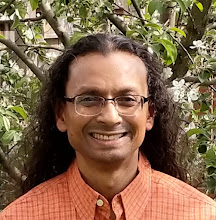
The day of the self-choice ceremony had finally arrived. The noise was deafening as the crowd of thousands cheered King Salya. He waved in gratitude as he made his way to the stage to meet the three princesses. The stadium was packed as the entire kingdom of Kasi had turned out to see who the princesses would choose for their husbands.
"Bhishma, Regent of Hastinapura! Representing King Vichitravirya!" screamed the announcer through his megaphone.
The crowd was silent, then rumblings of disapproval began as Bhishma climbed onto the stage. Bhishma's vow of celibacy was well known throughout the land and many felt he had no right to be participating in this ceremony. The three sisters whispered to each other as he approached. Bhishma paid no heed to the crowd's disapproval, but was instead evaluating the relative size of each princess for the next part of his plan. The youngest sister, Ambalika on his left, was a bit on the plump side, while the middle sister, Ambika, was extremely thin, but the eldest sister, Amba on his right was . . . well, she was just right. Bhishma raised his eyes to look in her face and their eyes met. Bhishma felt a tingle through his body in that moment but quickly looked away and disregarded it.
When he got near to them, the middle sister Ambika, smiled at him and asked, "Why is King Vichitravirya not here in person?"
Bhishma responded a bit nervously while looking away, "Actually . . . I’m here to take you to him."
Bhishma moved with lightning speed. He stepped forward and crouched between them, wrapped his left arm around Ambalika’s hips, while using his right hand to pull Amba behind Ambika and wrap his right arm around both of their hips. The princesses all screamed as he heaved all three of them up onto his shoulders, turned, leapt from the stage and ran for the exit.
The king of Kasi, upon hearing his daughters scream and seeing them being carried away, jumped from his throne on the stage and grabbed the announcer’s megaphone, "Stop him! He’s kidnapping the princesses!"
An enormous uproar from the crowd followed just as Bhishma made it out of the stadium to his waiting chariot. As soon as they were in, the charioteer sped off over the dry, flat, dusty terrain.
Shortly, the dust of dozens of chariots in pursuit could be seen. The larger transport chariot they were in was much slower than the small battle chariots in pursuit. It was only a matter of time before they would be caught. Bhishma readied his bow and drew an arrow at the now visible chariots, but instead of firing on them he turned and fired into the clear blue sky in front of their own chariot.
The arrow sailed high into the air and seemed to impact on the sky itself. There was a loud crack and a corresponding visible crack appeared across the sky, wider than could be seen. The princesses looked at each other in bewilderment, then water began to pour from the crack like a giant waterfall. The charioteer felt a twinge of panic, as they were not past it yet and the water was heading rapidly towards the ground.
An arrow whizzed by as the approaching chariots were now within firing range. The princesses crouched down, closed their eyes and held on tight, preparing for the impact of the water. The charioteer was yelling to command the horses even faster. Everyone cringed as they felt the water then heard the thunderous crash of it . . . behind them.
On the other side, the leading horses came to a grinding halt throwing some kings forward onto the ground. The horses reared up on their hind legs and neighed loudly. They ran in every direction despite a lot of whipping to try to control them. Many charioteers ran from their chariots, praying to god for mercy. Water splashed everywhere, and the dry ground was rapidly turning to mud. The scene was one of complete pandemonium.
Through it all came one chariot, led by a team of four magnificent horses, pounding forward towards the waterfall with unflinching determination. It was king Salya. His horses were renowned on the battlefield, for he trained them hard, but loved them even more. They were his children, and him their father, who they were ready to die for.
They hit the water at full speed. Salya and his charioteer sucked in a deep breath as they entered the downpour. The force of the water slowed the chariot to a halt and flattened them to the floor. The combination of no air to breathe and the constant pounding of the water meant they would be unconscious in another minute and drown. The horses, however, had the strength in their legs to stand, but more importantly, their heads had made it through to the other side.
Despite the overwhelming desire to collapse right then and there, the horses knew their father was drowning. So with every ounce of strength they had, they struggled and pulled until the chariot started moving again and didn’t stop until their father was safe.
Footnotes
1. Derived from: Adi Parva, Section CII, p. 219-220.





